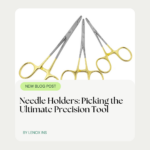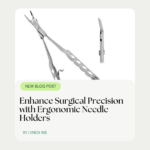Navigate Delicate Surgeries with the Right Needle Driver
- lenoxinstro
- November 6, 2024
- Dental Instruments, Dental Surgical, Needle Holder

Selecting the right needle drivers for delicate surgeries can significantly impact the precision and outcome of procedures. Many surgeons often overlook essential features of needle drivers, such as ergonomics and material quality, which can lead to challenges during surgeries. This guide will explore key features to look for when choosing needle drivers, the different types available for specific surgeries, and how to maintain them for optimal performance. By understanding these aspects, readers can enhance their surgical efficiency and ensure the highest standards of care, addressing any frustrations related to inadequate surgical tools.
Key Takeaways
- High-quality needle drivers are essential for precision in delicate surgical procedures
- Material composition significantly impacts the durability and performance of surgical instruments
- Ergonomic designs reduce surgeon fatigue, improving dexterity during lengthy operations
- Specialized needle drivers enhance control and grip in intricate surgical tasks
- Advances in needle driver technology promise enhanced surgical precision and efficiency for future procedures
Understanding the Importance of Needle Drivers in Delicate Procedures

Needle drivers play a critical role in enhancing surgical precision, especially in delicate procedures such as neurosurgery. Specialized instruments like hemostats and retractors are essential to address challenges that arise without them. The quality of these tools, including tungsten carbide needle drivers, directly influences patient outcomes, ensuring a higher standard of care during intricate surgeries. One particularly well-regarded instrument for these purposes is the Castroviejo needle holder.
The Role of Needle Drivers in Surgical Precision
needle drivers are essential surgical instruments that greatly enhance precision during delicate procedures, particularly in areas requiring acute tactile control. These tools are often crafted from high-quality materials, such as stainless steel with diamond dust coatings, which provide superior grip and minimize the risk of tissue damage. The choice of needle driver length and design should align with the specific needs of the surgery, allowing for effective manipulation of sutures and other instruments, such as rongeurs, ensuring optimal outcomes in surgical practice.
Challenges Faced Without Specialized Instruments
In the absence of specialized instruments, such as high-quality tungsten needle drivers, surgeons face significant challenges during microsurgery. The inability to achieve precise suturing can lead to complications, including tissue damage and increased recovery time for patients. Relying on standard tools like scissors or inferior instruments can compromise surgical outcomes, making it critical to select needle drivers made from surgical stainless steel that provide the necessary stability and control for delicate procedures.
- Importance of precision in surgical procedures
- Consequences of using standard tools
- Benefit of tungsten needle drivers for delicate surgeries
- Need for quality materials like surgical stainless steel
How Quality Instruments Affect Patient Outcomes
The quality of surgical instruments substantially affects patient outcomes, particularly in fields such as plastic surgery where precision is paramount. High-quality needle holders, for instance, enable surgeons to manipulate sutures and cannulas with greater control, reducing the risk of complications such as tissue damage. By investing in superior tools, healthcare providers can ensure that each procedure is performed with the utmost accuracy, ultimately enhancing recovery times and patient satisfaction. Consider exploring the range of micro surgery needle holders designed for such precision work.
Mastering delicate procedures requires the right tools. Next, let’s explore the key features that make precision needle drivers indispensable in surgical settings.
Key Features to Look for in Precision Needle Drivers

When selecting needle drivers for delicate surgeries, several key features must be considered to ensure optimal performance. Ergonomic designs enhance control during procedures, making it easier for the surgeon to navigate complex tissue layers. Different jaw types affect grip and precision, while material composition plays a critical role in durability. Additionally, the choice between ratchet mechanisms and spring handles influences operational efficiency, affecting the overall outcome in procedures involving tools such as curettes and speculums.
Ergonomic Designs for Enhanced Control
When selecting needle drivers for precision in delicate surgeries, ergonomic designs are paramount for enhancing control during procedures. Instruments such as the Webster needle holder, known for its comfortable grip and optimal jaw design, allow surgeons to maintain dexterity while navigating complex tissue environments. Furthermore, opting for high-quality steel materials in these instruments, along with a warranty for assurance, ensures longevity and reliability in performance, which ultimately supports successful surgical outcomes.
Jaw Types and Their Impact on Grip
The type of jaws on needle drivers significantly influences grip quality, affecting surgical performance in delicate procedures such as orthopedic and cardiac surgery. For instance, jaws designed with serrated edges enhance the grasping of materials like sutures or wires, which is crucial in liposuction procedures where precision is vital. Opting for titanium needle drivers can further improve grip stability, ensuring that surgeons maintain control during intricate operations while minimizing the risk of tissue damage.
Material Composition and Durability
Material composition is a critical factor when selecting a needle driver for precision in delicate surgeries. High-quality stainless steel, commonly used in reusable needle drivers, ensures durability and resistance to corrosion, making these instruments suitable for general surgery and repeated use. Selecting a needle driver crafted from reliable materials guarantees longevity, enabling surgeons to perform intricate procedures with confidence in their tools.
| Feature | Details | Benefits |
|---|---|---|
| Material Composition | High-quality stainless steel | Durability and corrosion resistance |
| Usability | Reusable instruments | Cost-effective for general surgery |
| Performance | Ensures precision and control | Improved surgical outcomes |
Ratchet Mechanisms Versus Spring Handles
Ratchet mechanisms and spring handles are two common designs found in needle drivers, each offering distinct advantages for surgical precision. Ratchet mechanisms provide a locking function, allowing surgeons to maintain consistent grip pressure throughout delicate procedures, which can enhance control and reduce the risk of unintended tissue injury. Conversely, spring handles offer a more responsive operation, enabling quick adjustments in grip that may be beneficial during fast-paced or intricate surgeries, ultimately contributing to a surgeon‘s efficiency and the overall success of the operation.
With a firm grasp on essential features, one must now consider the variations among needle drivers. Each type serves a unique purpose in surgery, designed for specific tasks and techniques.
Exploring Different Types of Needle Drivers for Specific Surgeries

Choosing the right needle drivers is crucial for achieving precision in delicate surgeries. Micro needle drivers are designed specifically for fine suturing, while tungsten carbide insert needle holders provide enhanced grip for complex tasks. Needle drivers with locking mechanisms ensure a secure hold during procedures, and specialized drivers for cardiovascular operations are tailored to meet specific demands. Each type contributes uniquely to surgical outcomes, making informed selection essential.
Micro Needle Drivers for Fine Suturing
Micro needle drivers are essential instruments for achieving precise suturing in delicate surgical procedures. Their design includes fine tips that enhance the surgeon‘s ability to maneuver in tight spaces, making them ideal for intricate tasks such as microsurgery or plastic surgery. By ensuring a secure grip on small sutures, micro needle drivers help reduce the risk of tissue damage, ultimately promoting better patient outcomes and enhancing recovery times.
Tungsten Carbide Insert Needle Holders
Tungsten carbide insert needle holders are highly regarded for their exceptional grip and durability, making them an ideal choice for delicate surgical procedures. The tungsten carbide inlay enhances the surface of the jaws, providing a superior hold on sutures and minimizing the risk of slippage during intricate maneuvers. Surgeons often rely on these needle holders for tasks requiring utmost precision, as they ensure controlled handling in tight or challenging surgical spaces. Tungsten carbide insert needle holders
Needle Drivers With Locking Mechanisms
Needle drivers equipped with locking mechanisms offer significant advantages in delicate surgeries by ensuring a secure grip on sutures throughout the procedure. This feature allows surgeons to maintain consistent pressure without continuous manual effort, minimizing the risk of unintentional tissue injury during intricate tasks. For example, in procedures requiring microsuturing, such as plastic surgery or vascular operations, these needle drivers provide the needed stability that enhances precision and contributes to better surgical outcomes.
Specialized Drivers for Cardiovascular Procedures
Specialized needle drivers for cardiovascular procedures are meticulously designed to accommodate the unique demands of cardiac surgeries. These instruments often feature elongated and slender jaws, enabling surgeons to work efficiently within the confined spaces of the heart and major vessels. The precision offered by these specialized drivers significantly enhances suturing capabilities, reducing the likelihood of complications and promoting quicker recovery for patients.
Understanding the types of needle drivers is just the beginning. Next, exploring the critical factors in selecting the right tool can lead to better outcomes in surgery.
Factors to Consider When Selecting Needle Drivers

When selecting needle drivers for precision in delicate surgeries, several factors demand attention. Compatibility with needle sizes and suture materials ensures that the chosen instrument can handle specific tasks effectively. Additionally, the surgeon’s hand size and comfort play a vital role in maneuverability during procedures. Sterilization requirements and ease of cleaning are essential for maintaining instrument hygiene, while balancing cost with longevity and performance can significantly impact overall surgical outcomes.
Compatibility With Needle Sizes and Suture Materials
When selecting needle drivers for precise surgical tasks, compatibility with needle sizes and suture materials is paramount. Surgeons should ensure that the chosen needle drivers are designed to accommodate the specific sizes of needles and sutures used in their procedures. For instance, fine sutures require needle drivers with delicate jaws that provide a secure grip without causing damage, facilitating optimal suturing in sensitive areas. By matching needle drivers with the appropriate materials and sizes, surgeons enhance their control and precision, ultimately contributing to improved surgical outcomes and patient recoveries. Needle drivers
Surgeon’s Hand Size and Comfort
The hand size and comfort of the surgeon are crucial factors when selecting needle drivers for intricate procedures. A well-fitted needle driver can enhance dexterity and reduce fatigue during lengthy surgeries, ultimately leading to better precision and outcomes. Surgeons should consider instruments that accommodate their hand dimensions, ensuring that the grip feels natural and supportive while maintaining optimal control over sutures and tissue manipulation.
Sterilization Requirements and Ease of Cleaning
Ensuring proper sterilization and ease of cleaning are vital when selecting needle drivers for surgical use. Instruments should be compatible with standard sterilization methods, such as autoclaving, to eliminate any risk of infection during delicate procedures. High-quality needle drivers made from materials that resist staining and corrosion make cleaning straightforward and maintain instrument reliability over time.
- Importance of sterilization for patient safety
- Compatibility with autoclaving and other methods
- Material selection for ease of cleaning
Cost Versus Longevity and Performance
When selecting needle drivers for delicate surgeries, balancing cost with longevity and performance is essential. While high-quality instruments may have a higher initial price, their durability and reliability often offset the expense over time, resulting in fewer replacements and increased efficiency during procedures. Surgeons benefit from investing in superior needle drivers, as they ensure consistent performance, reduce the likelihood of instrument failure, and contribute to optimal patient outcomes.
- Initial costs of needle drivers versus long-term savings
- Impact of quality on surgical efficiency and patient outcomes
- Considerations for frequency of use in surgical practice
Choosing the right needle driver is just the beginning. Proper use and care will ensure precision when it matters most.
Maintaining Precision Through Proper Use and Care

Proper use and care of needle drivers are essential for maintaining precision in delicate surgeries. Best practices for handling during surgery help prevent mishaps, while routine inspection for wear and tear ensures that instruments remain reliable. Techniques for sharpening and servicing are crucial for optimal performance, and effective storage solutions contribute to preserving instrument integrity long-term.
Best Practices for Handling During Surgery
To maintain precision during delicate surgeries, proper handling of needle drivers is essential. Surgeons should grip the instrument firmly yet delicately, ensuring a secure hold while avoiding excessive pressure that may damage tissues. Regular practice sessions can enhance dexterity and muscle memory, allowing surgeons to maneuvers with increased confidence and control during intricate procedures.
Routine Inspection for Wear and Tear
Routine inspection for wear and tear is essential in maintaining the effectiveness of needle drivers during delicate surgeries. Regular evaluations allow surgeons to identify any signs of damage, such as dull tips or compromised grips, ensuring that these instruments deliver the necessary precision. By incorporating systematic checks into their maintenance practices, healthcare professionals can significantly reduce the risk of instrument failure, thereby enhancing patient safety and outcomes.
Sharpening and Servicing Techniques
Maintaining the sharpness and functionality of needle drivers is essential for ensuring precision in delicate surgeries. Surgeons should implement regular sharpening techniques to restore the tips of needle drivers, when necessary, using specialized tools designed for surgical instruments. Additionally, consistent servicing, including checks for alignment and tension in the locking mechanisms, can significantly enhance the reliability and overall effectiveness of these critical tools, ultimately contributing to successful surgical outcomes. For specific tools designed for this purpose, consider visiting Castro Viejo Needle Holder.
Storage Solutions to Preserve Instrument Integrity
Proper storage solutions play a vital role in preserving the integrity of needle drivers, ensuring these critical surgical instruments remain reliable for delicate procedures. Instruments should be stored in dedicated, clean storage containers or trays that prevent contact with contaminants and minimize the risk of damage. Utilizing organization systems, such as labeled compartments, helps maintain an orderly environment, allowing for efficient access and ensuring needle drivers retain their precise functionality over time. storage containers or trays
Even with the best care, tools evolve. The next wave of needle driver technology promises to change how precision is achieved in the operating room.
Innovations and Advances in Needle Driver Technology

The field of needle driver technology is evolving, incorporating advanced materials to enhance performance and durability. Ergonomic designs reduce surgeon fatigue during prolonged procedures. Innovations such as force feedback technology provide real-time insights into tissue resistance, improving precision in delicate surgeries. These advancements highlight the future potential of needle drivers, particularly in the realm of microsurgery.
Incorporation of Advanced Materials for Better Performance
The incorporation of advanced materials in needle driver technology significantly enhances surgical performance. Modern needle drivers often utilize high-strength alloys and composites that provide increased durability and improved grip without adding unnecessary weight. For instance, needle drivers made with titanium or tungsten carbide have been shown to resist wear and maintain their sharpness longer, which is essential during delicate surgeries where precision is crucial.
Ergonomic Enhancements for Reduced Fatigue
Ergonomic enhancements in needle driver design are crucial for minimizing surgeon fatigue during lengthy and intricate procedures. Modern needle drivers often feature contoured grips and balanced weights, which facilitate a comfortable hand position and reduce strain on the wrist and fingers. By incorporating these ergonomic improvements, surgical instruments can significantly enhance dexterity and control, allowing surgeons to focus on precision without the distraction of discomfort.
- Importance of ergonomic designs for reduced fatigue.
- Benefits of contoured grips and balanced weights.
- Enhancement of dexterity and control during surgery.
Technological Integrations Like Force Feedback
Recent advancements in needle driver technology, such as the integration of force feedback, offer significant benefits for precision in delicate surgeries. This innovative feature provides surgeons with real-time feedback regarding tissue resistance, enabling them to adjust their grip and technique accordingly, which minimizes the risk of accidental damage during intricate procedures. By enhancing tactile awareness, force feedback-equipped needle drivers aid in improving overall surgical outcomes, making them an essential consideration when selecting tools for delicate surgeries:
.
| Innovation | Benefits | Applications |
|---|---|---|
| Force Feedback Technology | Real-time feedback on tissue resistance | Microsurgery, plastic surgery, cardiac procedures |
| Ergonomic Designs | Reduced surgeon fatigue, enhanced dexterity | Extended surgeries, complex procedures |
| Advanced Materials | Increased durability, improved grip | General surgical instruments, reusable tools |
The Future of Needle Drivers in Microsurgery
The future of needle drivers in microsurgery holds promising advancements that focus on enhancing surgical precision and efficiency. Emerging technologies, including smart needle drivers equipped with sensors, are enabling real-time monitoring of tissue resistance, allowing surgeons to adjust their techniques seamlessly during intricate procedures. Additionally, the continued integration of ergonomic designs and lightweight materials will further improve comfort and control, making these specialized instruments invaluable assets in the realm of delicate surgeries. For those interested in microsurgical instruments, you might find these tools particularly relevant.
Conclusion
Selecting the right needle drivers is crucial for achieving precision in delicate surgeries, as it directly impacts patient outcomes and recovery times. Key factors such as material quality, ergonomic design, and compatibility with specific surgical needs significantly enhance control and reduce the risk of complications. By investing in high-quality instruments, healthcare providers can ensure each procedure is performed with the utmost accuracy, leading to better surgical results. Ultimately, proper selection and care of needle drivers are essential for maintaining the highest standards of surgical excellence.





